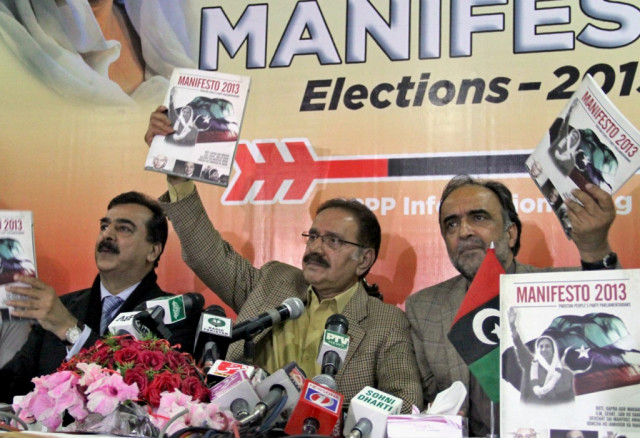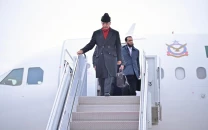Discussing elections: PPP’s manifesto devoid of people’s aspirations, speakers
PPP, other parties criticised over inconsistencies, gaps in election manifestoes.

The manifesto was released by the party president Makhdoom Amin Fahim at a press conference. PHOTO: INP
If Bhutto was alive, he would be surprised, if not shocked, to see the manifesto of the Pakistan Peoples Party Parliamentarians presented ahead of the 2013 elections.
Mosharaf Zaidi, an analyst and former government advisor, stated this at a seminar on ‘Relevance of Manifesto in Political Dynamics of Pakistan - a discussion on manifesto of Pakistan People’s Party (PPP)’ at the Sustainable Development Policy Institute (SDPI).
He also expressed surprise over the fact that the PPP manifesto is only available in English, with no provision for Urdu readers.
Earlier, SDPI Executive Director Abid Qayum Sulehri opened the discussion and told the participants that nobody from the PPP was ready to talk on their manifesto. The day’s scheduled speaker, former K-P governor Barrister Masood Kausar, who was also formerly information secretary for the PPP, also could not make it to the discussion.

Asif Memon, a researcher at SDPI, was of the view that the contents of the manifestos of various political parties are largely unchanged from the last elections, which indicates their failure to implement the policies they promised last time. “What does it mean? Was there something wrong with the policies or were they not devised properly?” asked Memon. When it comes to education and the medium of instruction, he continued, there is a split among the policies of political parties. There isn’t any mention of revenue generation avenues regarding certain policies which shows the mismatch between voters and the policy recommended by the party.
“Almost all the political parties have promised to increase spending on education, but no one is elaborating where this huge sum of money will come from,” he said.
About the important points missing from the PPP manifesto, he said there is nothing related to security and it is surprising that it is not in their priority list when the situation has cost the lives of thousands of Pakistanis.
Zaidi underscored that the PPP manifesto carries numerical problems. In the latest manifesto, he said, the PPP promised to increase the adult literacy rate from 54 per cent to 85 per cent by 2018, while asking where the PPP will procure funding to achieve the goal.
Jinnah Institute Director Raza Rumi said after the historic completion of a full five-year term by the democratically-elected PPP government, the next step is to move towards a broader political reform agenda.
“The reforms must start with the democratisation of political parties through intraparty elections, establishing a transparent system of party funding and expenditure, and strict adherence to the promises made in their manifestoes,” he added.
He was of the view that political parties failed to become institutions largely due to the continual disruption of the democratic system by military dictators and the non-existence of a democratic culture within the parties.
He expressed hope that after first democratic transition, political parties would learn that the path to real democracy goes through democratisation of their own rank and file.
Talking about the manifestoes presented by political parties in 2008, he said most of the parties missed out on engaging the youth which represent 54 per cent of Pakistani voters.
Published in The Express Tribune, April 2nd, 2013.



















COMMENTS
Comments are moderated and generally will be posted if they are on-topic and not abusive.
For more information, please see our Comments FAQ